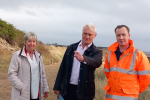Member of Parliament for Beverley and Holderness, Graham Stuart has written to East Riding of Yorkshire Council to urge it to take up additional funding, made available from central Government to extend the reach of the Broadband East Riding project.
Mr Stuart said, “In February the Secretary of State announced the additional funding, worth £250 million across the whole of the UK, with £5 million earmarked for East Riding.
“I understand there are some issues around the provision of match funding, contract and procurement but it’s vital the council does all it can to navigate these problems so we can drive superfast connectivity further and deeper into our rural communities.
“Earlier this year I visited Elliott Eggs in Bewholme, a company that is currently relying on an inefficient satellite-based system to connect the business to vital recording, packing and market information systems. Bewholme is currently lying outside the main roll-out of Superfast Broadband and I’ve encouraged residents and businesses in the area to register their interest in getting an improved service in the hope of putting the Parish on the map for investment in future phases of the project.”
East Riding Councillor for Mid Holderness, John Holtby said, “I’m determined to see as many communities as possible benefit from the public funding to extend superfast broadband services to rural areas.
“Increasingly services such as tax and VAT returns are moving online; product registration, marketing, development and maintenance need a reliable internet connection to enable rural businesses to compete in the market place.
“The agricultural community is becoming heavily dependent on being able to do business through the internet. It will soon be impossible to contact the Rural Payments Agency without it. Alongside this, residential customers are demanding a faster connection to access education, entertainment and social media services.
The Superfast Extension Funding was announced to increase the coverage of Superfast Broadband to 95% of properties by 2017.


